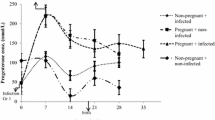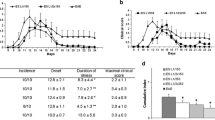Abstract.
To evaluate whether pregnancy has a synergetic effect on the host's immune response against Trichinella spiralis infection, immunological and parasitological parameters relating to the infection were assessed in pregnant rats and compared to those observed in virgin infected rats. The muscle parasite load was lower in pregnant infected rats but no differences were found in the intestinal worm burdens or the fecundity of female worms. The ability of sera to mediate death in newborn larvae (NBL) in an antibody-dependent cell cytotoxicity assay was higher for pregnant rats, even in the absence of specific anti-NBL antibodies. High levels of total and anti-NBL IgE were found in both groups, however, these levels were higher in the group of pregnant infected animals. No differences were found in anti-NBL IgGAM titers, nevertheless in some pregnant infected rats these antibodies were found earlier. No differences were found in peritoneal or blood eosinophil counts. Offspring born to infected dams were found to be infected. The results obtained in this model demonstrate that during pregnancy there is an enhanced helminthotoxic effect towards the NBL. Despite this immunoactivation, vertical transmission of the parasite is possible.
Similar content being viewed by others
Author information
Authors and Affiliations
Additional information
Electronic Publication
Rights and permissions
About this article
Cite this article
Nuñez, .G., Gentile, .T., Calcagno, .M. et al. Increased parasiticide activity against Trichinella spiralis newborn larvae during pregnancy. Parasitol Res 88, 661–667 (2002). https://doi.org/10.1007/s00436-002-0599-2
Received:
Accepted:
Issue Date:
DOI: https://doi.org/10.1007/s00436-002-0599-2




